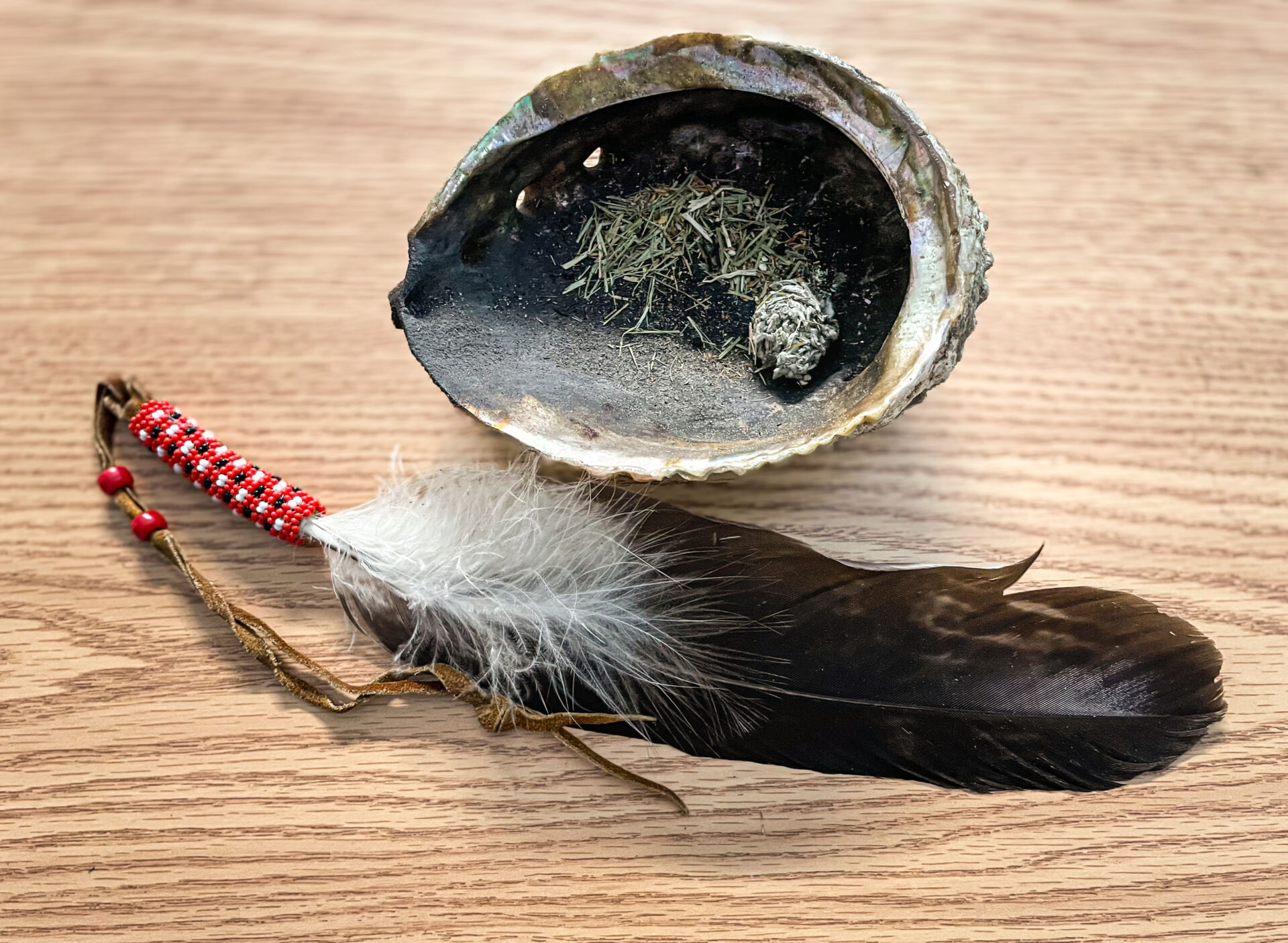The Wounded Healer

A residential school survivor’s journey through spiritual healing
I found myself surrounded by darkness following a devastating health diagnosis that would alter the course of my life forever. I was hospitalized and started treatment faster than I could process what was happening. Revolving through stages of grief I felt scared and lost, leaving behind my home, husband, and our almost 1 year old baby boy for the chance to survive. The days felt overwhelming and the nights long and lonely as I often found myself staring out of the window into the vast darkness, filled with uncertainty.
Through my ongoing experience, I have met more medical professionals than I could count, but one encounter resonated with me. Amidst the chaos came a gentleman, Dean Shingoose, a Spiritual Health Practitioner. Dean had offered to do a private smudging ceremony, an Indigenous prayer using sacred plants and herbs when he learned that I was unable to participate in the group ceremony. An abalone shell held sweet grass, sage, cedar, and tobacco which was lit by a wooden match. The sacred plants began to burn creating a spiraling smoke which was fanned toward my body during prayer. Dean began the purification of my hands, head, ears, eyes, mouth, body, and lastly my heart, all representing a form of purification, dedication, and healing of the whole body, mind, and spirit.
I had come to learn that Dean was a residential school survivor. In 1967 at the age of 7, he was sent to Brandon Indian Residential School where he attended grades 2 and 3. He recalls his first week being tied up to a wooden plank and placed standing in the bathroom. When he tried to move, he fell face first onto a cement floor. He was also forced to fight everyday as a form of entertainment for the older boys and to toughen up. His daily survival routines created overwhelming uncertainty and anxiety. If a student was caught after trying to run away, they had a razor strap used on them while they stood with their pants down in front of the other students to punish and humiliate them, as well as to set an example. Dean witnessed physical, mental, and emotional abuse which he has spent his whole life trying to forget. It was a dark period of his childhood where he was completely disconnected from his family and community.
In his adolescence, with no sense of meaning or direction in his life, Dean lived a very reckless and self-destructive lifestyle, turning to drugs and alcohol to cope with his suppressed feelings and anger. He was experimenting with various street drugs, almost overdosing a few times. He spent 2 years in and out of the Calgary Detention Centre as a juvenile delinquent. His best friend had committed suicide at 19 years old causing Dean to fall into a dark depression following his friend’s tragic death, even considering suicide himself when he had what he called a “spiritual experience” that changed the trajectory of his life. In his moment of despair, he called out to God and was overcome by a feeling of hope and love like he had never experienced before. He knew then that suicide was not the solution to his problems. That crisis moment marked a significant change and transformation in his life that has carried him for over 45 years. Dean has since devoted his life to providing spiritual care as a pastor and chaplain, and has been serving as a multi-faith, multi-cultural Spiritual Health Practitioner at the Foothills Medical Centre since 2005.
Dean believes healing is a lifelong process, a spiritual one. And an integral part of that healing is forgiveness. Although he believes no one is ever fully healed from their past, he feels we must learn to accept and embrace our hurt, trauma, and suffering and integrate it into our identity as a strength so we can be of service to others. Dean believes that a relationship of trust between Indigenous and non-Indigenous people must begin with an acknowledgement of the past, a willingness to right past wrongs, and a commitment to relationships based on equality and mutual respect, reconciliation, and healing. Reconciliation begins with relationships and allyship. Some thought-provoking questions he proposes for consideration are how many Indigenous people do you know or have in your circle? How many Indigenous friends do you have? If the relationship count is less than the fingers on one hand, what can you do to change that human equation? Reconciliation and healing cannot happen in isolation.
I had wondered how a man who had been through so much trauma could continue to carry himself with such kindness and grace today. Dean shared a quote by Henri Nouwen “Nobody escapes being wounded. We are all wounded people, whether physically, emotionally, mentally, or spiritually. The main question is not how can we hide our wounds so we don’t have to be embarrassed, but how can we put our woundedness in the service of others? When our wounds cease to be a source of shame and become a source of healing, we have become wounded healers.”
Dean left my hospital room that day and I struggled to hold back tears. I was scared of what my future held. But in my time of despair, he offered me a moment of sincere human connection and hope that maybe things would turn out okay. I understood then that when we are not strong enough to stand on our own, it’s in our connection with others that we can find comfort and healing. Our interactions no matter how small have a lasting impact on the world around us, reminding us to always lead with love.
About the author: Krystyna Wong is a pharmacy technician with 18+ years of experience, currently dedicated to her role in Correctional Health.

One reply on “The Wounded Healer”
Krystyna is a very Dear Friend of mine and I know how difficult her health struggles are on her and her beautiful family. She had shared her experience with Dean Shingoose with me and I know that it helped her through a very difficult time. As hard as it is for people to hear of other peoples struggles, we can also learn from them through sharing like this. I am grateful that Krystyna and Dean have chosen to share.